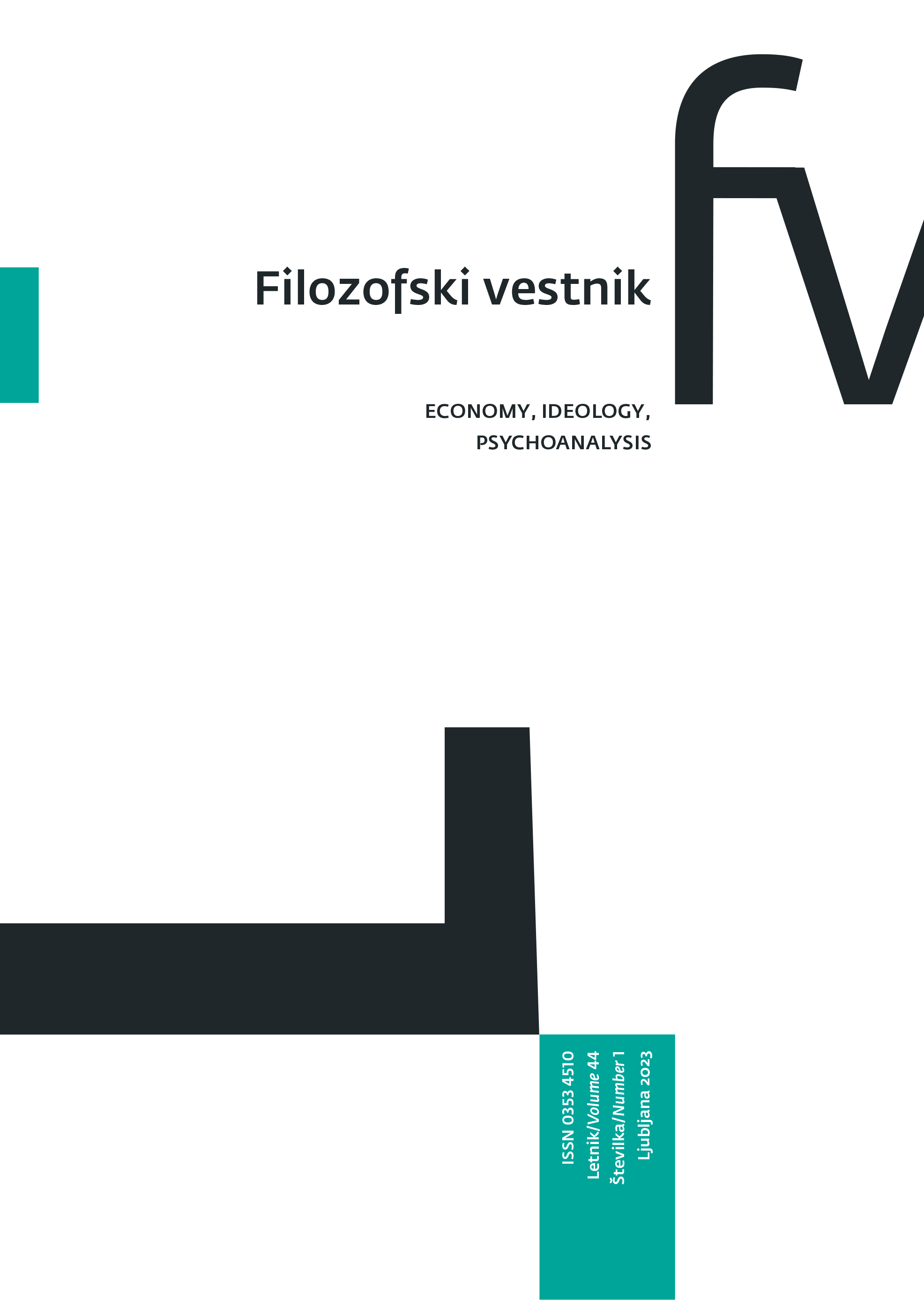K materialističnemu branju pojma (ekonomske) institucije pri Thorsteinu Veblenu
DOI:
https://doi.org/10.3986/fv.44.1.01Ključne besede:
Veblen, Cantor, institucije, teorija množic, miselne navade, instinktiPovzetek
Thorstein Veblen je nekoč dejal, da je študij instinktov njegov edini pomembnejši doprinos k ekonomski teoriji. Instinkti so pogoji in vzroki v ozadju oblikovanja miselnih navad, medtem ko so slednje sine qua non gradniki institucij. Članek zastavlja sledeče vprašanje: kakšno konceptualno obliko bi zavzela Veblenova relacija med instinkti-miselne navade-institucije, če bi jo zastavili kot formalni sistem? Pri tem miselne navade razume kot čiste ideje v Platonovem smislu (eidos) – mnoštva mišljena kot Ideje –, kot jih podaja teorija matematičnih množic Georga Cantorja ter filozofsko osmišlja postulat Alaina Badiouja »matematika je ontologija«. Namen članka je: (1) pokazati, kako so miselne navade, ki privzamejo obliko institucij, abstrahirane od vse vsebine, lahko formalno mišljene kot matematične množice; (2) povezati Veblenov ključni instinkt, delovni instinkt, v ekvivalenco z aksiomom prazne množice in s tem nakazati Veblenovo materialistično orientacijo.
Prenosi
Literatura
Almeida, Felipe. “The Psychology of Early Institutional Economics: The Instinctive Approach of Thorstein Veblenʼs Conspicuous Consumer Theory.” EconomiA 16, no. 2 (May–August 2015): 226–34. https://doi.org/10.1016/j.econ.2015.05.002.
Ayres, Clarence E. The Industrial Economy: Its Technological Basis and Institutional Destiny. Boston: Houghton Mifflin, 1952.
Badiou, Alain. Being and Event. Translated by Oliver Feltham. London: Continuum, 2005.
Badiou, Alain. Conditions. Translated by Steven Corcoran. London: Continuum, 2008.
Badiou, Alain. Theoretical Writings. Edited and translated by Ray Brassier and Alberto Toscano. London: Continuum, 2004.
Cantor, Georg. “Foundations of the Theory of Manifolds.” Translated by Uwe Parpart. The Campaigner. The Theoretical Journal of the National Caucus of Labor Committees 9, no. 1–2 (1976): 69–96.
Cordes, Christian. “Veblen’s ʻInstinct of Workmanship,ʼ Its Cognitive Foundations, and Some Implications for Economic Theory.” Journal of Economic Issues 39, no. 1 (March 2005): 1–20. https://doi.org/10.1080/00213624.2005.11506778.
Deleuze, Gilles. Desert Islands: And Other Texts, 1953–1974. Edited by David Lapoujade. Translated by Michael Taormina. Los Angeles: Semiotext(e), 2004.
Deleuze, Gilles. Empiricism and Subjectivity: An Essay on Hume’s Theory of Human Nature. Translated by Constantin V. Boundas. New York: Columbia University Press, 1991.
Deleuze, Gilles. Instincts et institutions: Textes choisis. Paris: Hachette, 1953.
Foucault, Michel. Archaeology of Knowledge. Translated by A. M. Sheridan Smith. London: Routledge, 2002.
Fraenkel, Abraham A., Yehoshua Bar-Hillel, and Azriel Levy. Foundations of Set Theory. With the collaboration of Dirk van Dalen. 2nd ed. Amsterdam: Elsevier, 2001.
Hegel, Georg W. F. The Science of Logic. Edited and translated by George Di Giovanni. Cambridge: Cambridge University Press, 2010.
Heidegger, Martin. The Question Concerning the Thing: On Kant’s Doctrine of the Transcendental Principles. Translated by James D. Reid and Benjamin D. Crowe. London: Rowman and Littlefield, 2018.
Ishida, Noriko. “Thorstein Veblen on Economic Man: Toward a New Method of Describing Human Nature, Society, and History.” Evolutionary and Institutional Economics Review 18, no. 2 (September 2021): 527–47. https://doi.org/10.1007/s40844-020-00194-x.
Marx, Karl. “Difference Between the Democritean and Epicurean Philosophy of Nature.” Translated by Dirk. J. Struik and Sally R. Struik. In Karl Marx (1835–43), edited by Jack Cohen, James S. Allen, N. P. Karmanova, P. N. Fedoseyev et al., 25–108. Vol. 1 of Karl Marx, Fredrich Engels: Collected Works. London: Lawrence and Wishart, 1975.
Searle, John R. “What is an Institution?” Journal of Institutional Economics 1, no. 1 (June 2005): 1–22. https://doi.org/10.1017/S1744137405000020.
Veblen, Thorstein. Absentee Ownership and Business Enterprise in Recent Times: The Case of America. New York: B. W. Huebsch, 1923.
Veblen, Thorstein. The Instinct of Workmanship and the State of the Industrial Arts. New ed. New York: B. W. Huebsch, 1918.
Veblen, Thorstein. The Place of Science in Modern Civilisation and Other Essays. New York: B. W. Huebsch, 1919.
Veblen, Thorstein. The Theory of Business Enterprise. New York: Charles Scribner’s Sons, 1904.
Waller, William. “Reconsidering Thorstein Veblen’s Use of Instincts.” In The Anthem Companion to Thorstein Veblen, edited by Sidney Plotkin, 39–68. London: Anthem Press, 2017.
Wible, James. “Why Economics Is an Evolutionary, Mathematical Science: How Could Veblen’s View of Economics Have Been So Different Than Peirce’s?” Journal of the History of Economic Thought 43, no. 3 (September 2021): 350–77. https://doi.org/10.1017/S1053837220000450.
Prenosi
Objavljeno
Kako citirati
Številka
Rubrike
Licenca
Avtorske pravice (c) 2023 Avtorji

To delo je licencirano pod Creative Commons Priznanje avtorstva-Deljenje pod enakimi pogoji 4.0 mednarodno licenco.
Avtorji jamčijo, da je delo njihova avtorska stvaritev, da v njem niso kršene avtorske pravice tretjih oseb ali kake druge pravice. V primeru zahtevkov tretjih oseb se avtorji zavezujejo, da bodo varovali interese založnika ter da bodo povrnili morebitno škodo.
Podrobneje v rubriki: Prispevki





